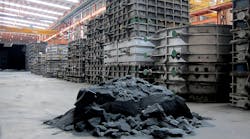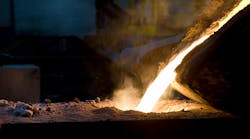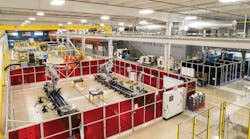In a joint statement, HA International and Lignol Energy Corp. reported their production trials of a new foundry resin that uses a renewable chemical formula based on lignin, an organic polymer, have been successful. The trials involved production of ferrous and nonferrous castings for impellors used in several pumping applications.
The developers said results met or exceeded customer requirements for performance and reduced smoke and odor at pouring. They added that the new resin formulation displaces certain petrochemicals normally found in resins by using Lignol’s High Performance Lignin (HP-L
™), a renewable chemical made from biomass.
HA International supplies chemical products for coremaking and moldmaking, including resin systems for bonding sand, resin-coated sand for the shell process, and refractory coatings.
“Displacing petrochemicals in our resin formulation with High Performance Lignin can ultimately lead to providing our customers with greater price stability and better environmental performance,” stated HA International vice president - R&D and Quality Doug Trinowski, “HA International supports sustainability and we’re committed to the use of renewable materials that can minimize the environmental impacts of our products while improving their performance and value.”
Vancouver-based Lignol develops biorefining technologies for biofuels, including fuel-grade ethanol, and renewable chemicals from non-food cellulosic biomass feedstocks.
Lignol uses a “modified solvent-based pre-treatment technology” to convert cellulose to ethanol and to produce “renewable” chemicals, including high-purity HP-L
™ lignins. The HP-L
™ lignin used in the new foundry resin is among the high-purity lignin extractives (and their derivatives) that can be engineered for various industrial applications.
“Foundry resin formulations represent a significant global market opportunity for our company,” said Lignol president and CEO Ross MacLachlan. “This trial validates the vision and development work undertaken by HAI and Lignol over the past year to develop ways to displace petrochemicals by incorporating our unique High Performance Lignin.”
Latest from Materials
Latest from Materials
Melt/Pour
Modeling Aluminum Oxidation
Feb. 27, 2024
Materials
Quiz: Know the Metals!
Aug. 29, 2023
Issues and Ideas
OSHA Cites Schumann for Blast
Aug. 22, 2023
Melt/Pour
Reducing Alloying, Improving Castability
July 17, 2023
Materials
SinterCast CGI Volume Hits a New High
July 11, 2023
Issues and Ideas
LIFT, DoD Renew Co-Op
May 17, 2023








